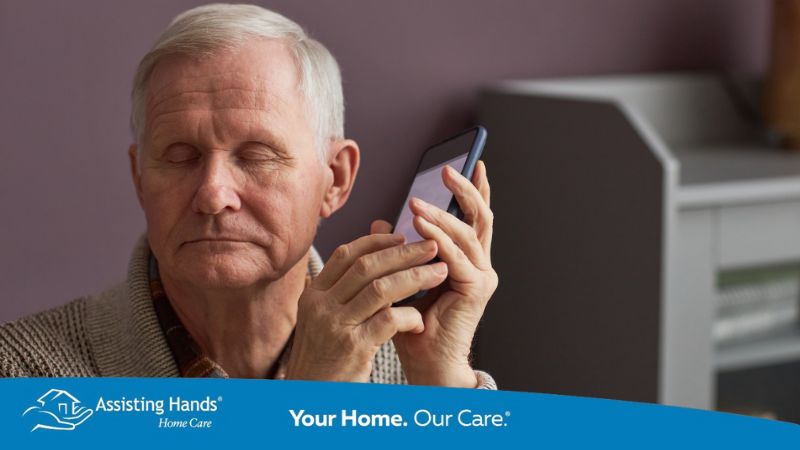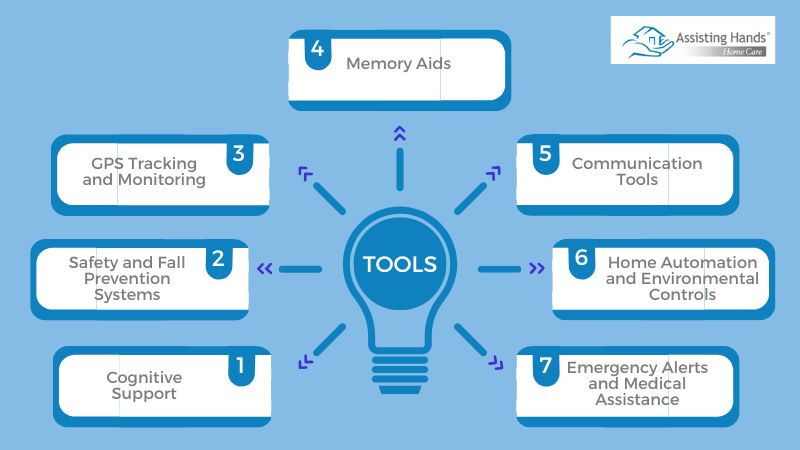

Dementia, a progressive condition that affects memory, thinking, and behavior, presents unique challenges for both individuals and their caregivers. As the condition advances, people living with dementia may experience confusion, difficulty with daily tasks, and changes in behavior, which can make caregiving complex and emotionally taxing. In-home dementia care can provide comfort, familiarity, and a sense of security, but it often requires innovative solutions. Assistive technology (AT) plays an essential role in improving quality of life, promoting independence, and offering support to both patients and caregivers.
What is Assistive Technology?
Assistive technology refers to devices or systems that help individuals with disabilities or chronic conditions perform tasks that would otherwise be difficult or impossible. In the context of dementia care, AT aims to provide a range of solutions that enhance safety, simplify daily activities, and maintain a sense of autonomy for people living with dementia.
Types of Assistive Technology for Dementia Care

Memory Aids
-
- Digital Reminders and Calendars: Specialized apps or devices, such as electronic pill dispensers, can remind individuals to take their medications or attend appointments. These reminders can be set to alert caregivers as well, ensuring important tasks aren’t overlooked.
- Digital Photo Frames: Some digital frames display pictures with captions to help people recognize family members, friends, and familiar locations. These frames can be updated remotely by family members, providing a continuous source of visual support.
- Voice-Activated Assistants: Devices like Amazon Echo or Google Home offer hands-free assistance with basic tasks like setting reminders, making phone calls, or checking the weather. These tools can reduce stress and encourage independence.
GPS Tracking and Monitoring
-
- Wearable GPS Devices: People with dementia may experience wandering, which can be a major safety concern. GPS-enabled wearables, such as smartwatches or pendants, allow caregivers to track the individual’s location in real time, helping to prevent disorientation and ensure prompt intervention when needed.
- Smartphone-Based Tracking: Apps like “Find My” on iOS or “Family Locator” on Android can also be used to keep track of loved ones’ movements and offer reassurance to both caregivers and patients.
Safety and Fall Prevention
-
- Fall Detection Systems: Many wearable devices come with built-in fall detection features that alert caregivers or emergency responders when a fall occurs. These systems can immediately trigger help, reducing the risk of complications from falls.
- Smart Home Sensors: Motion detectors or pressure sensors can be placed around the home to alert caregivers if a person with dementia is up and moving during the night or if they’ve left a designated safe space. These sensors can also track movement patterns to identify potential risks early.
Cognitive Support
-
- Cognitive Training Games and Apps: Technology can also aid in cognitive stimulation by offering games and exercises that are designed to engage and maintain cognitive function. Apps designed specifically for people with dementia focus on improving memory, reasoning, and problem-solving skills through various interactive challenges.
- Electronic Books and Tablets: Large-button e-readers or tablets equipped with dementia-friendly interfaces allow individuals to access books, music, or videos with ease. These devices can be a form of entertainment, relaxation, and cognitive exercise, while also enabling family members to stay connected.
Communication Tools
-
- Video Calling: For individuals with dementia, maintaining social connections can be difficult as their memory and ability to engage with others decline. Video calling platforms, such as Zoom or Skype, can help bridge the gap between patients and their loved ones. These platforms help reduce isolation by enabling face-to-face interaction even when distance is a barrier.
- Speech-to-Text Software: Speech recognition tools, such as Dragon NaturallySpeaking, can assist individuals who struggle with writing or typing. These tools allow them to speak directly into a microphone, with the software converting their words into text. This can be particularly helpful for people with dementia experiencing communication difficulties.
Home Automation and Environmental Controls
-
- Smart Home Systems: Home automation can play a vital role in enhancing the living environment for people with dementia. Smart thermostats, lighting systems, and door locks can be controlled remotely, offering caregivers the ability to adjust settings to ensure comfort and safety. For example, automated lighting that dims at certain times of the day can help individuals with dementia adjust to daily routines more easily.
- Voice-Controlled Appliances: In homes where individuals with dementia live independently or semi-independently, voice-controlled devices such as smart lights, thermostats, or even kitchen appliances can be of great assistance. These technologies help reduce confusion and make it easier for individuals to perform daily activities.
Emergency Alerts and Medical Assistance
-
- Panic Buttons: Wearable panic buttons or emergency alert systems can be life-saving. In the event of an emergency, the individual can easily press a button that will notify caregivers or emergency services, providing a quick response.
- Smart Medication Management: Medication management is often a significant challenge for individuals with dementia. Smart pill dispensers can not only remind individuals to take their medications but also dispense the correct doses at the proper times, minimizing the risk of missed or double doses.
Benefits of Assistive Technology in Dementia Care
- Increased Independence
Assistive technology empowers individuals with dementia to maintain their independence and continue performing daily tasks, such as managing medications, using appliances, and communicating with others, with minimal assistance. This can foster a sense of dignity and self-worth. - Improved Safety and Security
With devices like fall detectors, GPS trackers, and smart home sensors, the risks associated with wandering, falls, and other accidents are reduced. Caregivers have peace of mind knowing they can monitor their loved one’s safety at all times. - Enhanced Caregiver Support
Caregivers benefit from the time-saving features of AT. Automated reminders, remote monitoring, and digital tools reduce the workload and stress that often accompany dementia care, giving caregivers more time for other responsibilities or self-care. - Better Quality of Life
Technology can improve the overall well-being of people living with dementia by helping them stay connected with loved ones, engage in cognitive exercises, and enjoy familiar activities. This contributes to a higher quality of life, allowing them to live in the comfort of their own homes for longer.
Assisting Hands Home Care
While assistive technology can significantly improve a dementia patient’s independence and well-being at home, nothing replaces the human touch provided by the professional memory caregivers at Assisting Hands Home Care. We provide dementia patients with compassionate and personalized dementia care.
Our memory care services are provided in the comfort of the senior’s home—an important factor, considering living in a familiar environment increases feelings of security and reduces disorientation. Professional caregivers promote the senior’s safety and engage them in memory exercises.
Dementia care responsibilities include stimulating seniors’ minds with card games, outings, and puzzles. We hold conversations to deter loneliness and isolation. Incontinence is discreetly handled, and agitated dementia patients are calmed with distractions. We also lead wandering seniors back to safety.
Additionally, our home care services are designed to support everyday activities. Caregivers shop for groceries, provide transportation to doctors’ offices or social events, give medication reminders, cook nutritious meals, perform light housekeeping, and assist with personal care activities, like bathing.
Families trust Assisting Hands Home Care for reliable memory care. Our caregivers are committed to promoting the physical and emotional wellbeing of seniors with dementia or Alzheimer’s disease. Call our Palos Heights, Illinois, location to schedule an in-home consult and learn more about home care.
